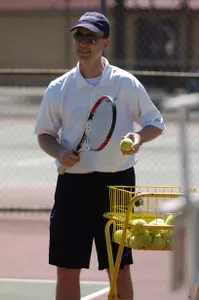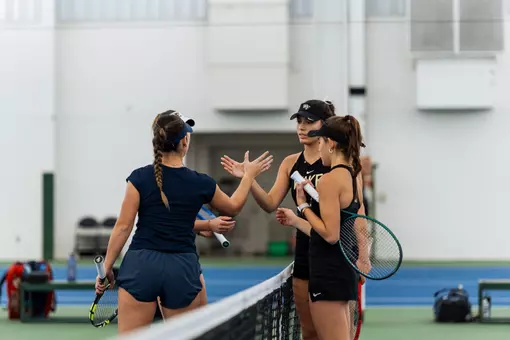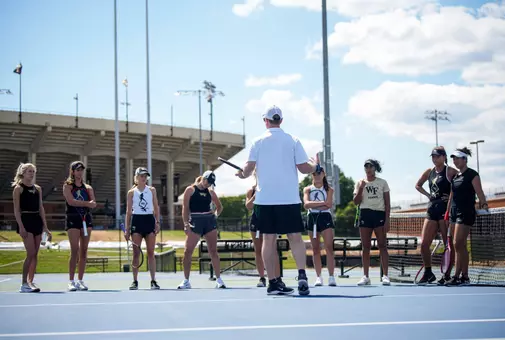
New Deacon Tennis Coach Epitomizes Wake Forest Values
9/22/2010 12:00:00 AM | Women's Tennis
Sept. 22, 2010
By Calais Zagarow, WakeForestSports.com
In the spring of 2009, Wake Forest University published a series of papers that explained the goals of the institution's new Strategic Plan. The fourth and final paper of the series was titled Educating the Whole Person and emphasized Wake Forest's everlasting commitment to fostering balance and success among all members of the Demon Deacon family.
Just over a year later, Wake Forest named Jeff Wyshner, a lifelong academic, educator and sports enthusiast, as head coach of the women's tennis team. Although there is not a direct connection between the advent of the Strategic Plan and the hiring of Wyshner, a quick look at the new tennis coach's past endeavors reveals a lifelong commitment to scholarship, education and sports that fits directly into Wake's goals for the future.
After graduating cum laude from Yale University in 1992 with degrees in Mathematics and Economics, Wyshner began to pursue his interest in education with a yearlong internship in the mathematics department at St. Paul's School, a boarding school in New Hampshire.
"Both of my parents were educators," says the Canaan, Conn. native. "My father was a school principal and my mother was an English teacher and librarian. So, I grew up thinking that I was going to be in an educational field."
Once his internship was over in 1993, Wyshner accepted his first full-time teaching position as a mathematics instructor at Horace Mann High School in New York City. During his four years at the private school, Wyshner was also enrolled as a part-time student in Columbia University's Teachers College and ended up being named the head coach of the women's tennis team at Manhattan College.
"My involvement in tennis as a profession just kind of happened," says Wyshner. "I had volunteered with the men's tennis team at Manhattan College and then the women's coach quit. So the next thing I knew, I was 23 years old and they were handing me a Division I women's tennis team."
After four years of teaching at Horace Mann and coaching at Manhattan College, Wyshner decided to pursue a doctorate-level degree so that he would have the qualifications necessary to be an athletic director or headmaster of a secondary school. Uninterested in the prospect of having to write a dissertation, Wyshner elected to return to Columbia University for a law degree.
"I figured, three years of classes, tests every semester, bar exam at the end, and then I'd have my doctorate," says Wyshner. "And when I was an undergraduate at Yale, Benno Schmidt was the President and his highest degree was a law degree. If it was good enough for the President of Yale, it was good enough for me."
Wyshner continued to coach the women's tennis team at Manhattan College, where he managed to take the 2001 team to their first ever appearance in the MAAC championship match. He also took over as the Director of Media Relations for Manhattan College during his final year of law school, while still coaching the women's tennis team.
After eight productive years of coaching and educating in New York City, Wyshner earned his juris doctorate from Columbia and accepted a head coaching position with the men's and women's tennis teams at Fairfield University in Fairfield, Conn.
Wyshner had five very successful seasons in the MAAC at Fairfield, becoming the first coach in conference history to ever be named Coach of the Year for both a men's and a women's team. However, in 2006, he accepted an offer to coach the women's tennis team at the University of Akron.
Throughout his time at Akron, Wyshner completely revitalized the university's ailing tennis program. By the end of his four-year tenure at the school, Wyshner had led the Zips to their best season in program history with a 19-3 record that earned them second place in the Mid-American Conference.
As his 2009-10 season in Ohio came to a close, Wyshner was invited to come down to Winston-Salem to interview for the head coaching position with Wake's tennis program.
"I knew that the opportunity to come here was an incredible one," says Wyshner. "You have one of the top 25 universities in the country in a climate that is much better for tennis. Then of course there are the ACC athletics. The combination is just impossible to match."
After his visit to Wake Forest, which was actually his first time coming to the state of North Carolina, Wyshner accepted the offer to be the new head coach of the women's tennis team and prepared his wife and two children for their first move below the Mason-Dixon line.
Although Wyshner has only been a member of the Demon Deacon family for a few weeks, he has already developed a high level of admiration and respect for the university that he now calls home.
"My experience here at Wake so far has not disappointed. It's an amazing place," says Wyshner. "It reminds me of Yale in some very positive ways and surpasses Yale in some ways. It's fun to be around people, both colleagues and student-athletes, who want to excel in everything they're doing."
In Wyshner's mind, excellence is achievable in following the five-word philosophy that he has long emphasized with his students and players: `Work hard and have fun.'
"When you're having fun it's easier to work hard, and when you're working hard, you feel good about yourself and it's easier to have fun," explains Wyshner. "If we do those things, then success takes care of itself."
In terms of success at Wake Forest, Wyshner's ultimate goal is to see Wake's women's tennis team rise from its 53rd place ranking last year back to the top 15, where the program was four years ago. The new coach would also love to see Wake Forest go after the ACC championship and eventually the national championship.
"That's the goal of every athletic program here at Wake, to put yourself in a position to be that successful," says Wyshner. "The resources are here and the quality of the university is here. It is a place where we should be competing for national championships."
Wyshner knows, however, that his talented, but small team of six players has a lot of work ahead of them in order to achieve their goals for the future. Part of the pressure the team currently faces is recruiting players to fill the two openings they have right now and the two spots that will open when two of the current players graduate in the next year. Yet, what the new coach feels is the greatest goal to fulfill at the moment is the adoption of a strategic approach to practices, matches and academics for his team.
"I try to make sure that the players have a balance, and what we talk about within the team is that we need to have deliberate practice," says Wyshner. "One of the keys to being a really successful student-athlete is to do everything effectively and in a deliberate manner. Don't study haphazardly and don't practice haphazardly."
Given Wyshner's track record as a tennis coach at other institutions, his goal of having a balanced and successful team, a goal very similar to that of Wake Forest University as a whole, should not be too difficult for him to achieve. Wyshner's past teams have received the ITA's All-Academic Team honor seven times (four at Manhattan, two at Fairfield and once at Akron) and his athletes have received either the ITA Scholar-Athlete All-American Award or their respective conference all-academic team recognition 79 times.
Wyshner can see how his own education is reflected in his coaching style and the achievements of his players. His competitive nature on the tennis court mirrors his preference for straightforward tests in courses involving numbers as opposed to abstract essays and analyses in other types of courses. Then there is the coach's law degree, which he believes helps him to make a compelling argument when it comes to communicating with his players.
"I'll tell my players that I'm going to come up with what I would like us to do and I'm happy to discuss it because I probably have seven reasons why that way is going to be best," says the coach, who is still a member of the New York State Bar Association.
Of all of his educational interests, however, Wyshner most often sees his knowledge of mathematics appear on the tennis court, something that he says happens more than his players would probably like.
"Just the other day, I handed the team a document that explains how winning one more point each set can actually make a 17% difference in the likelihood of winning a match," says Wyshner. "It showed them how important a single decision can be."
Beyond the help he has from his education, Wyshner has a very raw passion for tennis that complements his natural propensity for coaching. He recalls declaring that he would be a coach in the eighth grade, but at the time he wanted to coach college basketball because he had yet to start playing tennis. Wyshner began playing the sport at the age of 14 but spent most of his youth playing catch-up in order to reach the level that others had achieved at his age.
"It's probably one of my biggest regrets," says Wyshner regarding his late start in the game. "But maybe that's why I didn't lose my passion for it the way a lot of people do when they start playing when they're five. By the time they're 20 years old, they don't have the same passion for the sport that I've been able to keep since I was 14."
Wyshner realized later on in life that his personality was better suited for tennis rather than basketball and for women's sports rather than men's sports. While teaching high school math, Wyshner taught one of two sections of geometry honors. Over time he noticed that the male students tended to gravitate toward the other teacher when they needed extra help and the female students tended to come to him.
"My style of teaching and coaching is a little more interactive, a little more dependent on the relationship rather than yelling and screaming," says Wyshner. "Female students and athletes tend to respond better to my way of doing things."
When asked how he thinks his past players would describe him, Wyshner explains that his off-court relationship is what they most likely hold to be most valuable from their experiences playing for him. From the foreign student who doesn't know how to open a bank account to the players who need math, science or economics tutoring, Wyshner never hesitates to take his relationship with his athletes to a level that surpasses the sport.
"Many of my past players have reached out to me recently to tell me how happy they are for me to have this opportunity at Wake Forest because our relationship extended beyond the tennis coach and player," says Wyshner. "That process takes time, and I've only been here for a few weeks. However, I hope that I'll have the opportunity to have that great of a relationship with current and future Wake Forest players."
Although a small part of the lifelong Northerner is simply looking forward to being comfortable outside in North Carolina's mild winters, Wyshner is even more so looking forward to developing a strong relationship with Wake Forest University as a whole. According to the coach, his family wants to be as involved as possible with Wake Forest beyond the tennis program, be it supporting the Deacs in other varsity sports or having his daughter and son attend the camps during the summer.
"We can already tell in a few weeks that this is a very special place," says Wyshner. "We are so happy to be a part of the Wake Forest family."



